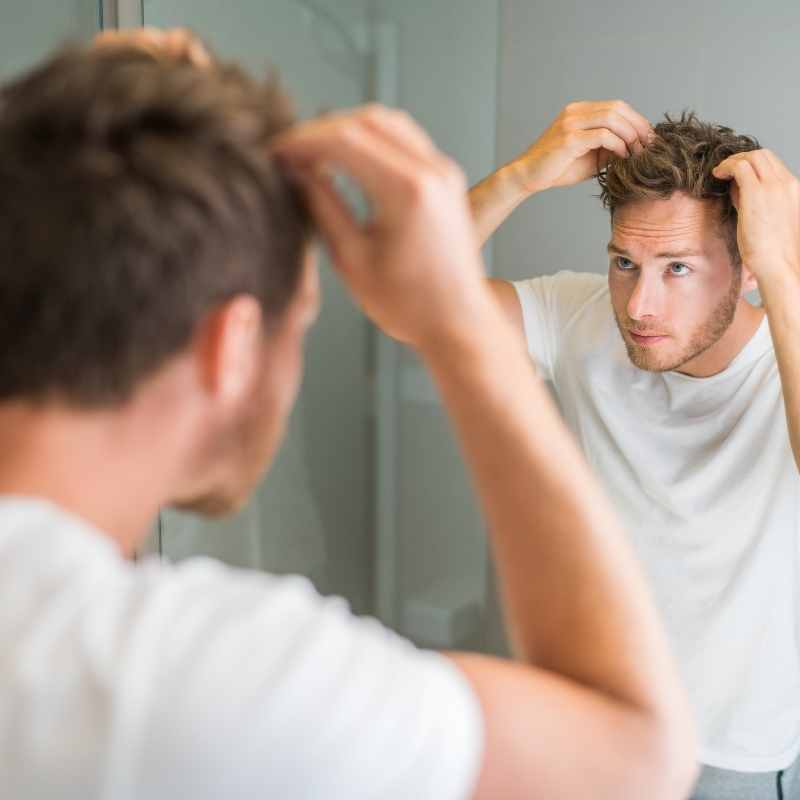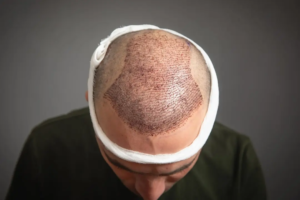Hair transplantation is not only an aesthetic procedure, but also a process that aims to improve your long-term hair health. However, the success of this process depends on the meticulous implementation of post-transplant care. Protecting your new hair is very important both for health and to improve visual results. By doing your post-hair transplant care correctly, you can both prevent complications in the treatment area and contribute to the healthier growth of your hair. Here are the basic points you should pay attention to for post-hair transplant care:
Post-hair transplant care in the first days
After hair transplantation, the first few days are the most sensitive period. Since the transplanted grafts are quite fragile, they should be given special care. At the beginning of the recovery process, you should be careful when washing your hair and avoid applying direct pressure to the head. For the first 2-3 days, it is necessary to rinse your head only gently with water. In addition, keeping your head elevated during this process can help reduce swelling in the treated areas.
It is important to avoid physical activities, prevent sweating and prevent excessive blood flow to the scalp. You should be careful not to touch your scalp so that the grafts do not move.
Things to consider after the first month
After the first month, it is quite normal to experience hair loss after the hair transplant. This loss usually occurs approximately 3-6 weeks after the transplant and paves the way for new hair to grow more healthily. But do not worry; this process is considered a completely natural and positive step. Keeping your scalp moist is beneficial in preventing dryness and itching. Moisturizers and oils recommended by your doctor can help you get through this phase more comfortably. You should also avoid contact with chlorinated water during the healing process. This can hinder the healing process.
Importance of 3-6 monthly checks
After 1-3 months have passed after the hair transplant, shedding usually slows down and a healthier appearance is achieved as new hair begins to grow. At this stage, it is important to continue using topical treatments and medications, following your doctor’s recommendations. Medications such as minoxidil and finasteride support new hair growth and protect the health of the transplanted area. In addition, using natural oils or treatment products that will help nourish the scalp will also help new hair grow healthier.
After hair transplantation, hair follicles begin to settle in the first few months and new hair begins to grow slowly. However, the healing process of each individual is different. At this point, control appointments organised at the 3rd and 6th months play a critical role in order to see the condition of the hair transplantation area and follow the progress. These appointments help your doctor evaluate your process after hair transplantation and observe if there are any unusual conditions.
During these follow-up visits, factors such as hair growth rate, quality of new hair and placement are examined in detail. In addition, possible complications or delays encountered in the post-transplant period can also be detected during these appointments.
Post-hair transplant care: What to expect in the first 10 months
5-8 months after hair transplant, most patients observe that the newly growing hair begins to increase visibly. During this period, most of the hair follicles become active and the growth rate accelerates.
By the end of the 10th month, the transplanted hair usually grows in a thicker, healthier and natural way. However, since in most cases the entire hair grows at different speeds, different lengths can be observed in certain areas. This can often create an aesthetically undesirable appearance. At this point, a small trimming procedure may be necessary to even out the hair and achieve a more uniform appearance.
12th month follow-up appointment: Evaluation of results
During the hair transplantation process, the 12-month follow-up is a period when the entire healing and hair growth process is completed and the final results are revealed. The final check-up is the perfect opportunity to evaluate the development of your hairline and how healthy and natural your hair has grown. Experts review the quality, density and natural appearance of your new hair.
The final check-up is also an important step to objectively observe the effectiveness of the hair transplantation and make minor corrections if necessary. In this process, it is meticulously examined whether the hair transplantation was successful and whether there are any negative conditions. You will also be provided with detailed feedback on changes in the hairline and the appearance of the hair.
FAQs about Post-Hair Transplant Care
When can I wash my hair after hair transplantation?
It is usually necessary to wait 2 days to wash your hair after hair transplantation. After the initial crusting process is completed (approximately 14 days later), you can start washing your hair gently. However, during this process, you should use the shampoos recommended by your doctor and wash carefully in order not to damage the hair grafts. It is very important to follow special care instructions to contribute to the healing process.
Can I exercise after hair transplantation?
After hair transplant, exercise should be avoided to support the healing process and prevent possible complications. It is necessary to stay away from heavy exercises for at least 3 weeks after hair transplantation. Light walks and stretching movements can be done after the first 14 days, but it is recommended that you consult your doctor about this. Exercise can increase blood flow and increase the risk of swelling and infection, so you should be careful.
Can I wear a hat after hair transplantation?
It is usually necessary to wait 3 days to start wearing a hat after hair transplantation. After this period, you can wear loose, cotton hats. However, it is very important that the hat does not put pressure on the head. Hard and tight hats can cause the transplanted hair follicles to dislodge or negatively affect the healing process. Therefore, you should be careful when using a hat.
When can I use hair products after hair transplantation?
After hair transplantation, it is usually necessary to wait 3-4 weeks before starting to use hair care products. Because some hair products can irritate the scalp and prevent the newly transplanted hair follicles from growing healthily. Your doctor will guide you on when you can safely use hair styling products. Using the products recommended by your doctor for post-hair transplantation care can speed up healing.
How long should I stay away from alcohol and smoking after hair transplantation?
After hair transplantation, alcohol and smoking should be avoided for at least 2 weeks. Alcohol can dilate blood vessels, making the healing process more difficult, while smoking can prevent the nutrition of the hair follicles and slow down healing. Therefore, you can help the healing process by staying away from both alcohol and smoking.
What happens if I touch my scalp after hair transplantation?
Touching the scalp after a hair transplant can cause the transplanted hair follicles to dislodge or cause an infection in the scalp. Such intervention can seriously damage the transplant process. You should avoid scratching, rubbing and pressing the scalp. Being careful after a hair transplant is critical for a healthy recovery process.
Why should you choose ViviMedi for hair transplant?
ViviMedi in Antalya, Turkey is a fully physician-led clinic specializing in hair transplant and hair loss treatments. Offering advanced treatments such as Micro FUE and DHI transplants, hair loss treatments, DHT blocking mesotherapy and more, we provide personalized solutions for each patient.
With state-of-the-art scalp analysis and expert care, ViviMedi is one of the most trusted and successful hair treatment centers in Turkey. With customized payment plans and an experienced team, you can make the right choice for hair transplants and hair care. In order to have a healthy recovery process after a hair transplant, you should take into account the recommendations of experts and be careful at every step.



